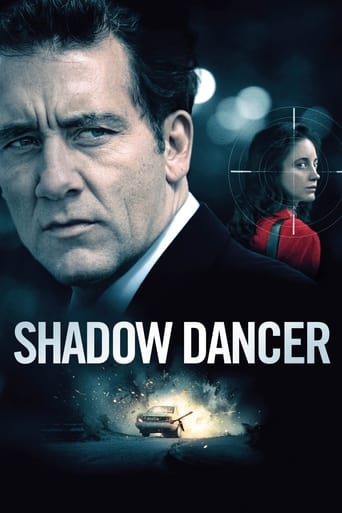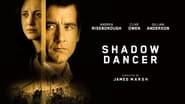paul2001sw-1
Andrea Riseborough is very good in 'Shadow Dancer', James Marsh's film about a reluctant IRA informer. I usually think of her as an archetypal English rose, but she plays a tough young Irishwoman with aplomb. The film, however, is extremely low key, especially Clive Owen, whose catatonic performance seems to be what his director ordered, but which adds to the general feeling of listlessness. The plot is nicely judged, but the execution lacks the tension the subject matter should impart.
sulkat
I have to disagree with Ruben Mooijman, who, in his review claims that Shadow Dancer does nothing to add to (or clarify) what we already know about this time period in Ireland, particularly Belfast. I believe this film goes a long way toward further illustrating the confusion and convolution of loyalties experienced by some families living in Northern Ireland at the time. Mooijman has completely ignored an important part of the film (or maybe it just went past him) concerning the fact that the mother of the younger IRA activists featured in the story turns out to have been a long-term "tout" or spy for MI5 (the Brits) and has been since 6 years or so after her own son, Sean, was killed in the crossfire in the '70s (at the beginning of the movie). The current IRA activists to whom I refer are young Gerry - we're never really privy to what has happened to their father, also called Gerry - Connor and Colette, all of whom were there the night their wee brother was sent out for fags for older Gerry, and rushed back into the house, shot in the chest. Later in the film, at the funeral of a fellow member, we can nearly taste the pride and camaraderie shared by the activists as they stand up against the occupiers when they try to bury their fallen friend "as a soldier." I dare say I learned more about the day-to-day life of people caught up in the IRA movement in Shadow Dancer than through any other film I've seen.I was privileged to travel throughout Ireland two years ago (our daughter now has dual British- American citizenship, and resides in Wales, and she arranged and accompanied us throughout our travels). The people of Ireland are wonderful, and most welcoming to Americans, even though many of them are still suffering the after effects of the struggles there (and let's not forget that parts of Ireland are still considered "occupied"). The fact is, some citizens of Ireland continue to feel much the same way as one of the characters in the film who angrily rejected the ceasefire gestures as a sell-out, and some have not been thrilled with the final outcome of the peace agreements. As with people throughout the world, carrying on day-to-day activities while operating within the bounds of ANY government, it often boils down to finally realizing that there are precious few people in one's life (and even in one's immediate family) that a person can really trust.
Theo Robertson
After rewatching and enjoying Brit thriller '71 I decided to watch another thriller using the Irish troubles as its background . SHADOW DANCR came and went without any publicity whatsoever typical of many movies produced by BBC Films and the basic plot just seemed like a generic DONNIE BRASCO type plot of someone working undercover in a criminal gang hoping the brown smelly stuff doesn't hit the fan . It's not necessarily a bad idea for a plot and the fact that it has been used so often in thrillers is because it's not a bad idea for a plot and was intrigued as to how the production might bring something new to the oft used basic story The answer to this is through the use of languer . For the first 15 minutes director James Marsh uses long shot lengths and minimal dialogue to tell the story which I suppose is to give the film a feel of a dream slowly turning in to a waking nightmare . Certainly this is probably preferable to a Michael Bay production with constant fast edits but at the same time it's very divisive and if a potential audience tuned in then tuned out after the first 15 minutes I could understand their motives . , but the Troubles wasn't a conflict involving large piece Stalingrad type battles no matter what Hollywood garbage tries to tell you and so the low key approach is more than justified . Another aspect that the production tries to make it stand out from its peers is simply to have the undercover protagonist a female and mother called Collette !!!! SUGGESTIVE SPOILERS !!!! As the story continues it plays out as you'd expect it of the IRA becoming more and more suspicious of having a mole in their organisation .. Perhaps because the informant is female and her MI5 handler is played by Clive Owen then you're expecting a romantic subplot to blossom and to be fair the screenwriter has resisted this . There is a subplot about another informant being protected meaning Collette is being used as the fall guy but when their identity is revealed it's all rather unconvincing and unexplained and seems to be included to bring the film to a stop which probably sums up the rest of the film
justincward
Clive Owen is an MI5 stooge who instantly turns a Belfast bomb-dropper-offer woman into an informer, in spite of saying, 'This is going to take some time'. And yes, we get it: Belfast in the troubles (which aren't over btw) is as bleak as it gets. Those IRA guys just want everyone to be as miserable as they are, it seems.Now, introduce hundreds of indistinguishable miserable characters without names or any particular reason to exist other than it's a 'political' film, yeah? A few vignettes of IRA funerals and suchlike, just to lighten the mood. Forget to show the heroine for half an hour, and focus on Clive Owen's double chin.Fast forward ninety minutes. Still awake? Suddenly, Clive and his informer kiss. Fast forward thirty more minutes. then she arranges for his car to be booby trapped even though he offered to elope with her, I think. Because her mother's an informer too, and she has to die.You see, those IRA types just can't be anything but miserable.Who wrote this tripe? Is that the Tom Bradby who was ITV's political editor? Stick to news, Tom. If it wasn't you, sorry.




